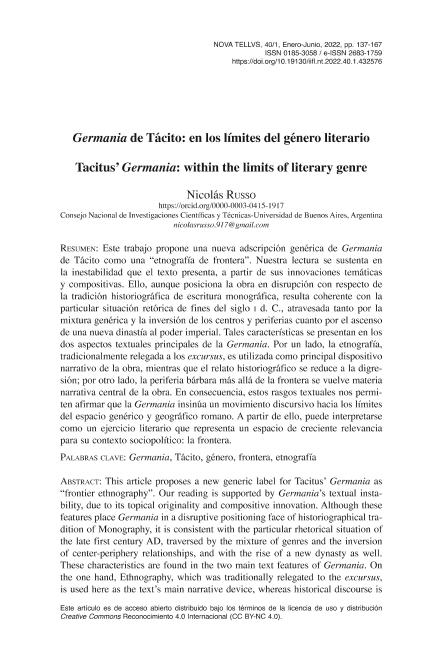Mostrar el registro sencillo del ítem
dc.contributor.author
Russo, Hugo Nicolás

dc.date.available
2023-02-07T13:37:42Z
dc.date.issued
2022-01
dc.identifier.citation
Russo, Hugo Nicolás; Germania de Tácito: en los límites del género literario; Universidad Nacional Autónoma de México; Nova Tellus; 40; 1; 1-2022; 137-167
dc.identifier.uri
http://hdl.handle.net/11336/187169
dc.description.abstract
Este trabajo propone una nueva adscripción genérica de Germania de Tácito como una ―etnografía de frontera‖. Nuestra lectura se sustenta en la inestabilidad que el texto presenta, a partir de sus innovaciones temáticas y compositivas. Ello, aunque posiciona la obra en disrupción con respecto de la tradición historiográfica de escritura monográfica, resulta coherente con la particular situación retórica de fines del siglo I d. C., atravesada tanto por la mixtura genérica y la inversión de los centros y periferias cuanto por el ascenso de una nueva dinastía al poder imperial. Tales características se presentan en los dos aspectos textuales principales de la Germania. Por un lado, la etnografía, tradicionalmente relegada a los excursus, es utilizada como principal dispositivo narrativo de la obra, mientras que el relato historiográfico se reduce a la digresión; por otro lado, la periferia bárbara al otro lado de la frontera se vuelve materia narrativa central de la obra. En consecuencia, estos rasgos textuales nos permiten afirmar que la Germania insinúa un movimiento discursivo hacia los límites del espacio genérico y geográfico romano. A partir de ello, puede interpretarse como un ejercicio literario que representa un espacio de creciente relevancia para su contexto sociopolítico: la frontera.
dc.description.abstract
This article proposes a new generic label for Tacitus’ Germania as “frontier ethnography”. Our reading is supported by Germania’s textual instability, due to its topical originality and compositive innovation. Although these features place Germania in a disruptive positioning face of historiographical tradition of Monography, it is consistent with the particular rhetorical situation of the late first century AD, traversed by the mixture of genres and the inversion of center-periphery relationships, and with the rise of a new dynasty as well. These characteristics are found in the two main text features of Germania. On the one hand, Ethnography, which was traditionally relegated to the excursus, is used here as the text’s main narrative device, whereas historical discourse is relocated to the digression. On the other hand, Barbaric periphery beyond the frontier becomes the central narrative matter of the text. Therefore, these textual features allow us to state that Germania insinuates a discourse move towards the limits of Roman generic and geographical space. Hence, Tacitus’ Germania can be interpreted as a literary exercise representing a new space within its sociopolitical context: the frontier.
dc.format
application/pdf
dc.language.iso
spa
dc.publisher
Universidad Nacional Autónoma de México

dc.rights
info:eu-repo/semantics/openAccess
dc.rights.uri
https://creativecommons.org/licenses/by-nc/2.5/ar/
dc.subject
GERMANIA
dc.subject
TÁCITO
dc.subject
GÉNERO
dc.subject
FRONTERA
dc.subject.classification
Literaturas Específicas

dc.subject.classification
Lengua y Literatura

dc.subject.classification
HUMANIDADES

dc.title
Germania de Tácito: en los límites del género literario
dc.title
Tacitus’ Germania: within the limits of literary genre
dc.type
info:eu-repo/semantics/article
dc.type
info:ar-repo/semantics/artículo
dc.type
info:eu-repo/semantics/publishedVersion
dc.date.updated
2023-02-06T10:13:33Z
dc.identifier.eissn
2683-1759
dc.journal.volume
40
dc.journal.number
1
dc.journal.pagination
137-167
dc.journal.pais
México

dc.journal.ciudad
Ciudad de México
dc.description.fil
Fil: Russo, Hugo Nicolás. Consejo Nacional de Investigaciones Científicas y Técnicas; Argentina. Universidad de Buenos Aires. Facultad de Filosofía y Letras. Instituto de Filología Clásica; Argentina
dc.journal.title
Nova Tellus
dc.relation.alternativeid
info:eu-repo/semantics/altIdentifier/url/https://revistas-filologicas.unam.mx/nouatellus/index.php/nt/article/view/903
dc.relation.alternativeid
info:eu-repo/semantics/altIdentifier/doi/https://doi.org/10.19130/iifl.nt.2022.40.1.432576
Archivos asociados
